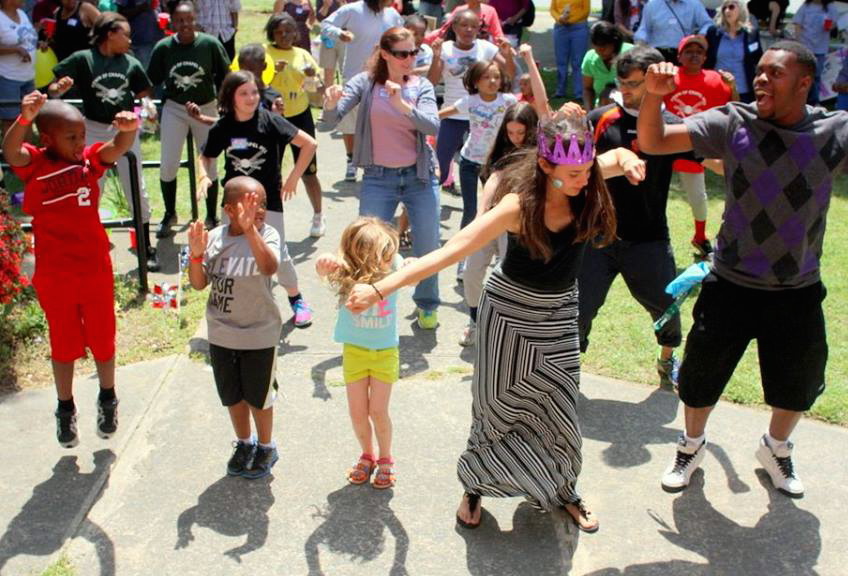For Della Pollock, preserving people’s life stories is more than a way to chronicle the past. It also creates a path for cultivating future aspirations.
A multi-year project that began in 2007 in collaboration with St. Joseph C.M.E. Church proved that point in ways Pollock, professor of communications at UNC, didn’t imagine at the time. As part of a service-learning initiative, Pollock began involving students in the life of Northside—an historically black neighborhood near downtown Chapel Hill—where they listened to oral histories of longtime residents and community leaders.

There, with Pollock as the center’s executive director, a community-based staff and more than 250 volunteers work each year alongside residents to honor, renew and build community within Northside. Carolina faculty members and students have always been an integral part of that work. In fact, Hudson Vaughan, one of Pollock’s former students, is co-founder and deputy director of the Jackson Center.
The relationship between the University and Northside was forged long ago.
For the past century, a number of Carolina employees have called the network of neighborhoods that make up Northside home. “Residents’ ancestors built the stone walls that surround the University and hauled water from the Old Well to student dorms,” Pollock said. “Many current residents worked for the University and UNC Hospitals in the past, and some continue to work there today.”
With more than 200 oral histories catalogued, the Jackson Center has become the linchpin for revitalizing a neighborhood that during the past three decades had seen exponential growth in the number of investor-owned properties and a corresponding decline in its black population. The center, which has always had a strong interest in housing advocacy, has partnered with the University, the Town of Chapel Hill and the Self-Help Credit Union to find ways to make Northside a diverse family-oriented neighborhood once again.

While previous efforts to stabilize the community never gained traction, this time seems to be different.
For one thing, it is a bottom-up leadership process according to Pollock.” The Northside Neighborhood Compass Group, made up of community representatives and partners, has vetted the plans and guided the strategic decision-making on Northside properties,” she said.
There also is strong motivation to use the past as a springboard for the future, just as the Jackson Center’s motto says: “Without the past, you have no future.” As residents shared their stories, they felt a renewed determination to build on the strengths of their multi-generational community.
“Northside residents express a great love and respect for the past,” said Linda Convissor, director of community relations at Carolina, “but they also want to shape the future.”
“Rather than trying to recreate the past or freeze the present, conversations now are more about preserving the traditional values of the African-American neighborhood as new residents move in,” she said. “People who live in Northside—many of whom have family ties that go back several generations—talk about the supportive, tight-knit community of their childhoods, and that’s what they want to carry into the future.”
In addition, residents have seen a revitalized commitment from the Town of Chapel Hill coupled with strong interest from top University leaders, beginning with former Chancellor Holden Thorp and continuing with the staunch support of Chancellor Carol L. Folt. Last March, the University provided a critical financial boost to the effort with a $3 million, 10-year, no-interest loan to Self-Help to help stabilize Northside.
“The University’s loan was a major catalyst for the Northside Neighborhood Initiative,” said Gordon Merklein, UNC’s executive director of real estate development, “but it is not a University-run effort.”
“The Jackson Center is a gateway to the neighborhood—really the boots on the ground, the people who have the ear and pulse of the neighborhood,” Merklein said. “The town wants to see the area thrive, especially with a new elementary school there. Self-Help knows community development real estate better than anyone, and the University brings the money and a desire to see Northside stabilized. It’s a win-win situation for everyone involved.”

Self-Help’s involvement is key, he explained, because the Durham-based institution understands the intricacies of buying, holding and selling properties to benefit the community. Self-Help acts as general contractor and loan manager. It pools the financial resources – the loan from the University plus grants the initiative has received – to acquire, renovate and resell available Northside properties to aspiring homeowners or affordable housing agencies, in keeping with the neighborhood’s goals.
The concept is called land banking. As a property becomes available, funds from the land bank are used to purchase it, and the property is held in the land bank until a good match is found. Self-Help determines whether it’s best to sell the home directly to a family or to buy down the cost and sell to an affordable housing agency like Habitat for Humanity or the Community Home Trust. Self-Help also can help secure funds to renovate a home.
“Essentially, the land bank allows the home to sit until the right buyer is found, and when the home is sold later, that money recycles back into the land bank,” Merklein explained.
The University’s loan is used solely to buy a property, not to renovate it or buy down the purchase price. Those efforts are funded through grants – to date, $75,000 from the Town of Chapel Hill to launch the Promise of Home program so elderly or disabled residents can make home repairs, and $750,000 from the Oak Foundation to support needed renovations and discount the sale price of land bank properties to keep them affordable.
So far, the University loan has been used to acquire six properties, including vacant lots and vacant houses, for the land bank. One property has been sold to Habitat, which plans to build three new homes there for low-income, first-time homeowners. In fact, for 2016-17, Habitat will focus its construction efforts in Northside, with a goal to build a dozen homes in the neighborhood, said Dan Levine, Self-Help’s director of business development and project management.
In less than a year, Northside has seen tangible change. Elderly residents’ homes are being repaired so the residents can remain there, and properties that otherwise might have been snapped up by investors are being held and repaired for sale to families.
“We’ve seen success even more quickly than we had anticipated,” Merklein said. “The University’s backing gave the initiative the momentum it needed to get off the ground. It also paved the way for other organizations, such as Habitat and the Oak Foundation, to become involved.”
“The chancellor was the driving force behind this unique opportunity to enhance the University’s historic relationship with Northside,” he said. “Thanks to Chancellor Folt’s resolve to turn the vision and commitment of so many people into reality, the residents in Northside are seeing real evidence that their neighborhood will remain a vital part of our community.”
The neighborhood itself deserves much of the credit, Convissor said: “Northside residents have always been active and engaged. It may seem contradictory, but their deep, abiding commitment to preserving their neighborhood is what motivated the investments that will secure its future.’”
For information about the Northside Neighborhood Initiative, see:
- UNC’s financial support
- Combining classroom and community
- The Jackson Center for Saving and Making History
Photos Courtesy of the Marian Cheek Jackson Center for Saving and Making History.
